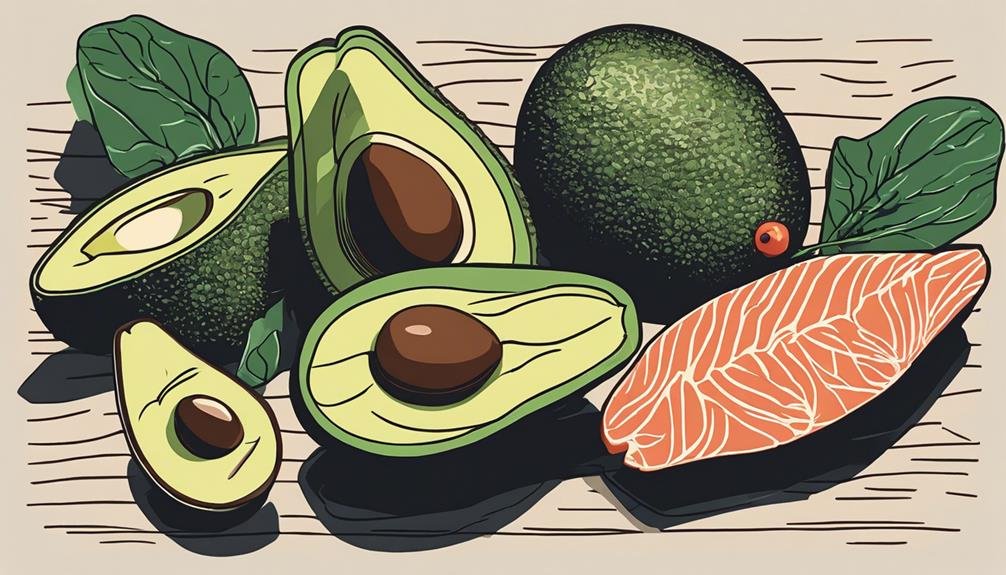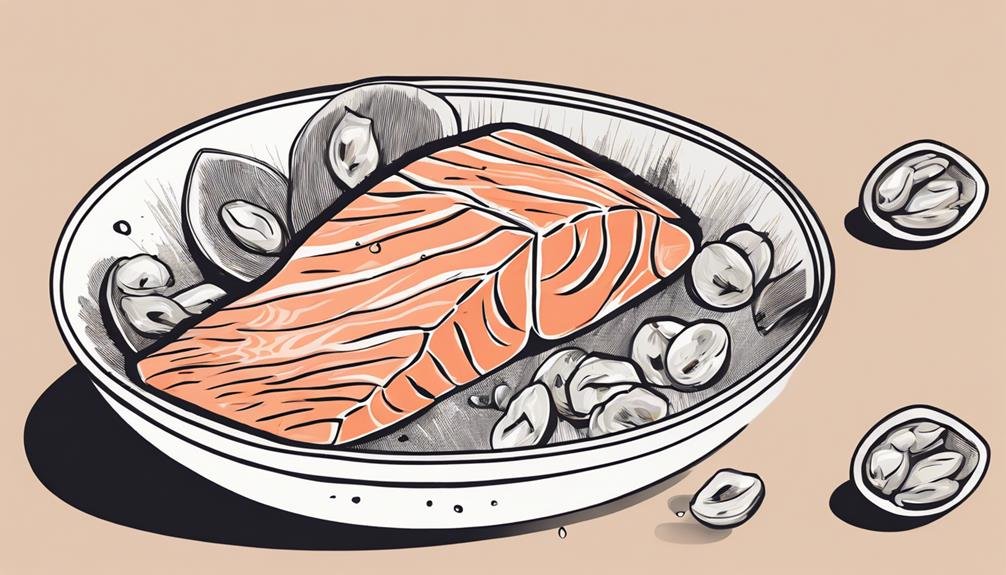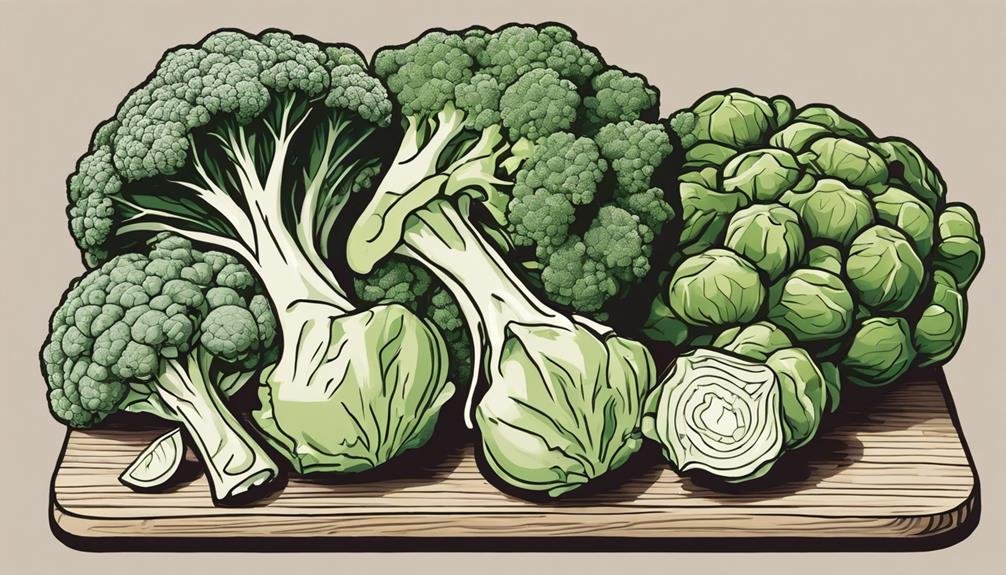10 Diet Strategies for Optimal Testosterone in Men 40
To optimize your testosterone levels after 40, focus on key diet strategies. Prioritize healthy fats from sources like avocados and nuts, and incorporate lean proteins such as chicken and fish. Whole foods rich in zinc, like spinach and pumpkin seeds, are essential. Limit sugar intake to maintain hormonal balance, and stay hydrated to support overall health. Embrace omega-3 fatty acids from fatty fish and plant sources. Monitor your caloric intake to avoid weight gain, and include cruciferous vegetables like broccoli. Reducing processed foods further enhances your diet. Stick around to discover additional insights that can boost your health.
Key Takeaways
- Prioritize healthy fats like avocados, nuts, and olive oil to support testosterone production and heart health.
- Incorporate lean proteins from sources like chicken, fish, and legumes to enhance hormone levels and muscle growth.
- Focus on whole foods rich in zinc, such as spinach and pumpkin seeds, to aid testosterone synthesis and overall health.
- Embrace omega-3 fatty acids found in fatty fish and walnuts to reduce inflammation and support hormonal balance.
Prioritize Healthy Fats
To boost your testosterone levels, make sure to load up on healthy fats like avocados, nuts, and olive oil. These fats are essential for hormone production and can help maintain ideal testosterone levels.
Incorporating these foods into your diet can also improve your overall health. For instance, avocados are rich in monounsaturated fats, which promote heart health and can enhance your body's ability to produce testosterone.
Nuts, particularly walnuts and almonds, provide omega-3 fatty acids, supporting hormone balance. Olive oil, a staple in Mediterranean diets, is linked to increased testosterone levels.
Incorporate Lean Proteins
Incorporating lean proteins like chicken, turkey, and fish into your diet can greatly enhance testosterone production and support muscle growth. These proteins provide essential amino acids that your body needs for hormone production, which is particularly important as you age.
Aim to include a variety of lean protein sources in your meals, such as eggs, low-fat dairy, and plant-based options like legumes and quinoa. By doing so, you not only boost your testosterone levels but also promote overall health and muscle repair.
Additionally, consider portion control to avoid excess calories while still meeting your protein needs. Remember, pairing these proteins with healthy fats and carbohydrates can further optimize your diet and help maintain balanced hormone levels.
Focus on Whole Foods

Why not prioritize whole foods in your diet to naturally boost testosterone levels and improve overall health?
Whole foods—like fruits, vegetables, whole grains, nuts, and seeds—are packed with essential nutrients that support hormone production. These nutrient-dense options provide vitamins and minerals that help maintain ideal testosterone levels.
For instance, foods rich in zinc, like spinach and pumpkin seeds, play an important role in testosterone synthesis. By focusing on whole foods, you not only nourish your body but also help reduce inflammation and support healthy weight management, both essential for hormone balance.
Limit Sugar Intake
Limiting sugar intake can greatly enhance testosterone levels and overall health. High sugar consumption can lead to insulin resistance, which negatively impacts hormone production, including testosterone.
When you cut back on sugary foods and drinks, you're not just preventing spikes in blood sugar; you're also supporting your body's hormonal balance. Focus on reducing processed sugars found in snacks, sodas, and desserts, and opt for natural sweeteners or fruits when you have a craving.
This shift can help stabilize your energy levels and improve mood, making it easier to maintain a healthy lifestyle. Remember, moderation is key—it's about creating sustainable habits that promote both your testosterone levels and overall well-being.
Make these changes, and your body will thank you.
Stay Hydrated

Staying hydrated plays an essential role in maintaining ideal testosterone levels and overall health. When you're dehydrated, your body can experience hormonal imbalances, which may negatively impact testosterone production.
Aim to drink plenty of water throughout the day, especially if you're active or live in a hot climate. You mightn't realize it, but even mild dehydration can lead to fatigue and reduced physical performance, both of which can affect your hormone levels.
Pay attention to your body's signals; if you're feeling thirsty or your urine is dark, it's time to hydrate. Consider incorporating water-rich foods like fruits and vegetables into your diet, too.
Include Zinc-Rich Foods
Including zinc-rich foods in your diet is crucial for supporting healthy testosterone levels in men. Zinc plays a critical role in hormone production, and a deficiency can lead to lower testosterone levels.
To boost your intake, think about adding foods like oysters, beef, pumpkin seeds, and lentils to your meals. These options aren't only delicious but also provide a wealth of other nutrients.
Aiming for around 11 mg of zinc daily can enhance your testosterone levels and overall health. If you're not getting enough from food, you might want to think about supplements, but always consult with a healthcare professional first.
Embrace Omega-3 Fatty Acids

Embracing omega-3 fatty acids can greatly boost your testosterone levels and overall health. These essential fats help reduce inflammation, improve blood circulation, and support heart health, all of which contribute to a more balanced hormonal profile.
You can find omega-3s in fatty fish like salmon, mackerel, and sardines, or through plant sources like flaxseeds, chia seeds, and walnuts. Incorporating these foods into your diet isn't just beneficial for your testosterone; it also enhances cognitive function and mood.
Aim for at least two servings of omega-3-rich foods each week to reap the rewards. By prioritizing these healthy fats, you're taking a significant step toward optimizing your testosterone levels and enhancing your overall well-being.
Monitor Caloric Intake
Monitoring caloric intake is essential for maintaining a healthy hormonal balance and maximizing testosterone levels.
When you consume more calories than your body needs, it can lead to weight gain, which negatively impacts your hormone production. On the other hand, too few calories can also hinder testosterone levels.
Aim for a balanced diet that meets your energy needs without excess. Track what you eat and be mindful of portion sizes to guarantee you're fueling your body appropriately.
Incorporate nutrient-dense foods that support testosterone production, such as lean proteins and healthy fats.
Eat Cruciferous Vegetables

Eating cruciferous vegetables can greatly boost your testosterone levels while promoting overall health. These nutrient-packed foods, like broccoli, cauliflower, Brussels sprouts, and kale, contain compounds that help regulate estrogen levels in your body. By balancing estrogen, you create a more favorable environment for testosterone production.
In addition to hormonal benefits, cruciferous vegetables are rich in vitamins, minerals, and antioxidants, which support your immune system and reduce inflammation.
Incorporating these vegetables into your meals is simple; try adding them to stir-fries, salads, or smoothies. Aim for at least a few servings each week to maximize their benefits.
Reduce Processed Foods
Reducing processed foods in your diet can greatly enhance your testosterone levels and overall health. These foods often contain unhealthy fats, sugars, and additives that disrupt hormonal balance. Instead, focus on whole, nutrient-dense foods to support your body's natural testosterone production.
| Processed Foods | Whole Foods |
|---|---|
| Sugary snacks | Fresh fruits |
| Fast food | Lean meats |
| Refined grains | Whole grains |
Questions
How Does Stress Affect Testosterone Levels in Men Over 40?
Stress can greatly lower your testosterone levels. When you're under pressure, your body releases cortisol, which interferes with testosterone production. Managing stress through relaxation techniques can help maintain healthier hormone levels.
What Role Does Sleep Play in Testosterone Production?
Sleep plays an essential role in testosterone production. When you prioritize quality sleep, your body regenerates and balances hormones effectively. Lack of sleep can lead to decreased testosterone levels, impacting your overall health and well-being.
Can Supplements Boost Testosterone Levels Effectively?
Supplements can help boost testosterone levels, but their effectiveness varies. You should consult a healthcare professional to determine what's best for you, as some supplements may have limited impact or cause unwanted side effects.
Are There Specific Foods to Avoid for Testosterone Health?
You should avoid processed foods, trans fats, and excessive sugar, as they can negatively impact hormone levels. Instead, focus on whole foods that support your overall health and hormone balance for ideal testosterone levels.
How Do Alcohol and Smoking Influence Testosterone Levels?
Alcohol and smoking can greatly lower your testosterone levels. They disrupt hormonal balance and affect your body's ability to produce testosterone, leading to potential health issues. Reducing these habits can help maintain healthy hormone levels.
Conclusion
You might think changing your diet is too hard or time-consuming, but it doesn't have to be!
By making small adjustments, like swapping out unhealthy snacks for whole foods or adding more healthy fats, you can boost your testosterone levels without feeling overwhelmed.
Remember, every little change counts, and soon you'll notice the benefits in your energy, mood, and overall health.
So, embrace these strategies, and take charge of your well-being—you've got this!







